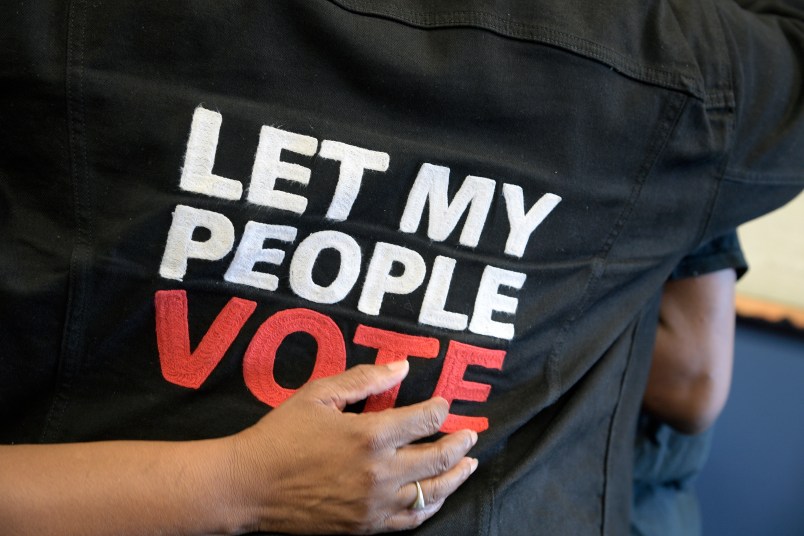This article is part of TPM Cafe, TPM’s home for opinion and news analysis.
On May 24, 2020, federal district court judge Robert L. Hinkle issued a sweeping rebuke to what he called Florida’s pay-to-vote system in a case reviewing the 2018 change to Florida’s Constitution that was intended to restore voting rights to ex-felons. Judge Hinkle ruled last month that Florida’s continued disenfranchisement of certain former felons was unconstitutional and the case is now on appeal to the 11th Circuit Court of Appeals. The Appeals Court has signaled that it will expedite the case.
Under the voter-approved Amendment 4, most ex-felons had their voting rights automatically restored once they had completed their sentences. Previously, ex-felons were disenfranchised for life. The basic idea behind the change was to allow a person who paid their debt to society and who was back in their community the opportunity to vote.
But shortly after Amendment 4 became part of the Florida Constitution, the Republican governor of Florida, Ron DeSantis, along with the Republican dominated state legislature swooped in with a new law (SB 7066), which said that ex-felons could not get their voting rights back unless they paid any remaining fees and fines. This put the rights of roughly a million people in flux because Florida doesn’t have an easy system for informing people of outstanding fees and fines. Moreover, some of the ex-felons at issue were impecunious and unable to pay the fees and fines they owe.
The Jones v. DeSantis case brought before Judge Hinkle challenges the Florida law as a violation of the Florida and U.S. Constitutions. As I explained here, the argument that the Florida law runs afoul of the U.S. Constitution is that it acts as an unconstitutional poll tax under the Twenty-Fourth Amendment and this law discriminates against some of the plaintiffs and is therefore a violation of equal protection.
Past attempts to get rid of felony disenfranchisement has fared poorly in the courts ever since Richardson v. Ramirez, 418 U.S. 24 (1974), which ruled that taking away felons’ right to vote was constitutional under the penalty clause of the Fourteenth Amendment.
So why might results be different in the Jones case? What may make a difference is the ridiculously bad facts for the state of Florida, including its failure to create a workable system so that ex-felons know for certain how much, if any, fees and fines they owe the state. As the judge complained in his decision: “even with a team of attorneys and unlimited time, the State has been unable to show how much each plaintiff must pay to vote under the State’s view of the law.”
The judge added that who should be paid by an ex-felon “may be unknowable. Individual victims may have died or moved to parts unknown, and corporate victims may have gone out of business or been merged into other entities. Indeed, there may be nobody to pay, even if a felon is willing and able to make a payment. Insisting on payment of amounts long forgotten seems an especially poor basis for denying the franchise.” This aspect alone makes the Florida system Kafkaesque.
Additionally, the state of Florida has put few resources into clearing ex-felons for voting. The rate that they clear cases is 57 voter registrations a day, despite an ongoing backlog of 80,000 applicants. Judge Hinkle thus expects the state to finish this initial batch in the year 2026 or possibly 2030 if more ex-felons try to register in 2020. There are roughly 1.4 million Floridians who could ask for their right to vote under Amendment 4.
Another factor is Richardson was centered on the ability of the state to take away the right to vote. This case is a little different because it is about the conditions for re-enfranchising citizens. And as the 11th Circuit already ruled in an earlier offshoot of this case, when restoring the right of felons to vote, a state must comply with constitutional provisions.
Finally, the trial court’s framing of the Florida law (SB 7066) as a pay-to-vote law may well be the final nail in the law’s coffin because some of the plaintiffs and many ex-felons in Florida simply do not have the money to pay the fees and fines to the state. If Florida insists on payment before voting, that effectively disenfranchises those individuals because of their poverty — which the Supreme Court rejected in Harper v. Va. State Bd. of Elections, 383 U.S. 663, 664 n.1, 668 (1966), ruling that a $1.50 poll tax violated the equal protection clause of the Constitution.
The judge also found GOP-penned law was in violation of the Twenty-Fourth Amendment because “Florida also cannot condition voting in state elections on payment of these fees and costs.”
Judge Hinkle ruled the pay-to-vote system is irrational as applied to individuals who are unable to pay — under equal protection analysis, when a law is deemed to be irrational, that means that it won’t survive any equal protection challenge.
Judge Hinkle has given the 11th Circuit many different ways to find the Florida law unconstitutional. It’s a good sign that the 11th Circuit is expediting the case. If they affirm Judge Hinkle quickly, then hundreds of thousands of Florida citizens will be able to register and vote in 2020.
Ciara Torres-Spelliscy is a fellow at the Brennan Center (though not a member of the Jones v. DeSantis litigation team), a Professor of Law at Stetson University and the author of the book Political Brands.






